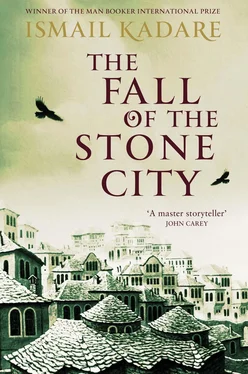It was now universally understood that after all that had happened, the ladies had shut themselves up indoors, never to emerge again. Among them were Mrs Pekmezi and Mrs Karllashi, two ladies of the House of Shamet who used an old family alphabet for their correspondence, and also a lady of the Çabejs, another of the Fico family and finally an elderly Kadare lady with her sister, Nesibe Karagjozi.
Clearly the ladies were beaten.
DAY 2,000
The setting of their star brought no joy. Secretly, people felt remorse at this disruption of the natural order. There was a feeling that the ladies would be gone for a long time. It would take decades, if not centuries, for the great Houses to produce new ladies, for only these cultivated families possessed the expertise. Without them it was predicted that the city would turn savage, but nobody knew in what way. The code of the ladies’ secrets had never been broken. Now their culture had been extinguished and it was impossible to say what might grow in the ashes they left behind.
Superficially the city remained the same. But to the much-abused surrounding villages and small towns, it seemed that the hour to settle scores had struck. Yet they did not dare. The city stood firm. With its ladies it had possibly held its head higher, but without them it seemed the more dangerous.
It now became clear that the city was unsuited not just to the new era but to any era. The news that it would be declared a “museum city” was welcomed as an honour by some, but the majority took it as a mark of shame. A third group tried to encourage hopes of the city’s regeneration. Words beginning with ‘re-’ appeared again, in feverish campaigns.
“Lunatics’ Lane” was at the top of the list for renaming. Some people thought this must mean demolishing the street, but this would not be easy. The principal obstacle was the house of the Leader of the new Albania, or rather its ruins, very close by. Families such as the Skëndulajs or the Shamets sometimes favoured and sometimes discouraged the demolition, while the Kadares’ house, which was also nearby but at the opposite end of the street, only suggested sinister ideas. It was in fact the other Kadare house in the Hazmurat neighbourhood whose bad reputation had clung to it ever since its owner, to the family’s shame, had gambled it away, but many people thought that it was this Kadare house in Palorto that would stain the city’s name for ever and ever. Nobody knew the reasons for this prophecy, but precisely because they were unknown, the curse seemed the more credible. People said a fire or a heavy British bomber might be able to dispel its evil aura.
LATER. DAY 3,000
However far-fetched they might seem, all these rumours about “Lunatics’ Lane”, whether its renaming or its demolition or the demolition of the entire city, were no more than a pale reflection of the conspiracies, cabals and other horrors that were hatched that winter among the highest echelons of power. The Leader’s drawn expression betrayed his fear of being overthrown but still he emerged the winner.
The decision to reconstruct his house to three times its original size was only one of the hopeful signs. The entire city’s spirits lifted. It had deluded itself with its fears of reprisals and humiliation. The order of the day was now not to humiliate the city, but to praise it to the skies.
A piece of good news arrived to increase the general joy. Rumours were generally ominous but this was something genuinely different. The city expected some rare treat; of what kind, nobody knew, not even the municipal leaders. But still the news spread. Probably there would be a big celebration with an important guest from the highest possible level. The city was no backwater to be awed by a visit. Besides the Leader, whose birthplace it was, the city had received King Zog and the princesses, his sisters, as well as Benito Mussolini of Italy and Victor Emmanuel, who was not only King of Italy and Albania but also Emperor of Ethiopia.
There had also been non-visits that did not take place such as, at the beginning of the century, that of the Ottoman sultan with his mother, the valide sultan, whose marshal of the levée was also a native of the city. The most recent unrealised visit was that of Adolf Hitler, who was supposed to have come to inspect a plane that the city claimed to have invented, which worked on the principle of perpetual motion. But the outbreak of war had prevented this.
None of these visits or non-visits could compare with the one that was now expected. Stalin was coming.
This great news ushered in the new year of 1953. The cold was no less biting but the icicles hanging from the eaves of the houses glistened as if for Easter.
DAY 3,033
Everybody was caught up in the intoxication caused by this news. From morning to night the cafés speculated on the reason why Stalin had chosen Gjirokastër of all places. Most people thought that it did not take great minds to work this out: the city was the Leader’s birthplace and it was well known that among all the leaders of the Communist Bloc outside of Russia, Stalin did not and could not have a more faithful devotee than the leader of Albania. Some suggested other reasons but only quietly and tentatively, mentioning for instance the ladies and how they had fallen. Among the thousands of cities in the Eastern Bloc, only ours had done away with its ladies.
For whatever reason, Gjirokastër would become for a few days the centre of the world. In fact, a secretly harboured desire of the city to become the centre of the planet just once was probably now coming out in the open.
As happens whenever people go too far, in the midst of the rejoicing it turned out that the city had been, as they say, riding for a fall. As January ended and February began, a dark thunderbolt struck: Stalin would not be coming.
After the first shock, when, having dreamed of being the summit of the world the city fell into a bottomless pit, a hail of questions fell. Why? Stalin must be angry, of course. This was the first guess, because anger caused most kinds of furore. He was no doubt angry at Gjirokastër, perhaps at Albania, if not the whole of Europe.
In 1908, when the sultan had cancelled his visit, it took several years to discover the reason, which turned out to be something that had not crossed anybody’s mind: the alphabet. The sultan’s court had protested that after the Ottoman Empire’s centuries-old love affair with Albania, the latter had treacherously rejected the Arabic script in favour of the Latin alphabet!
Of course Stalin was greater and more daunting than the sultan, and his explosion of fury would also be greater and more devastating.
DAY 3,042
Nobody could remember a more bitterly cold February. In its first week, instead of brighter news or at least no news at all, a shock came when the two doctors, Big and Little Gurameto, were arrested once again. For the first time they were not weighed in the balance against each other. Both men were seized at midnight, clapped in steel handcuffs and taken to the same prison.
TIME TURNS BACK. DAY 3,029
Nobody knew who was the first to notice it, still less mention it. Time was not just suspended, as it had been for the anaesthetised hospital patients nine years before; it was going backwards at great speed.
All sorts of reasons were suggested. One was that Stalin was not ageing but growing younger, by some secret technique. Consequently time was flowing backwards, to match. Soon we would reach not 1954 but 1952, and so on: 1949, 1939, 1937. .
There was no news of the doctors.
Nobody had ever seen the Cave of Sanisha but everyone talked about it. The cave was universally imagined as the deepest and most terrifying dungeon of the city’s prison, which was housed in the ancient castle that dominated Gjirokastër. It had been closed up since the time of Ali Pasha Tepelene, whose sister Sanisha gave it its name. This young woman had been kidnapped and raped and her assailants had been tortured in this cell for days and nights on end, while Ali Pasha himself watched through a secret spyhole.
Читать дальше












